60 year anniversary of Sputnik today! - Some reflections from inside the European Space Agency
Today marks 60 years since the famous ”Sputnik moment” when the Soviet Union caught the world by surprise with their successful launch of the first ever human-made object into orbit on 4. October 1957. For the history books, Sputnik 1 is brought up in many contexts. It was the first ever satellite, it was a pinnacle moment of the cold war, and perhaps most notably, it marked the beginning of the space race between America and the Soviet Union which has lead to much of what we see in space also today.
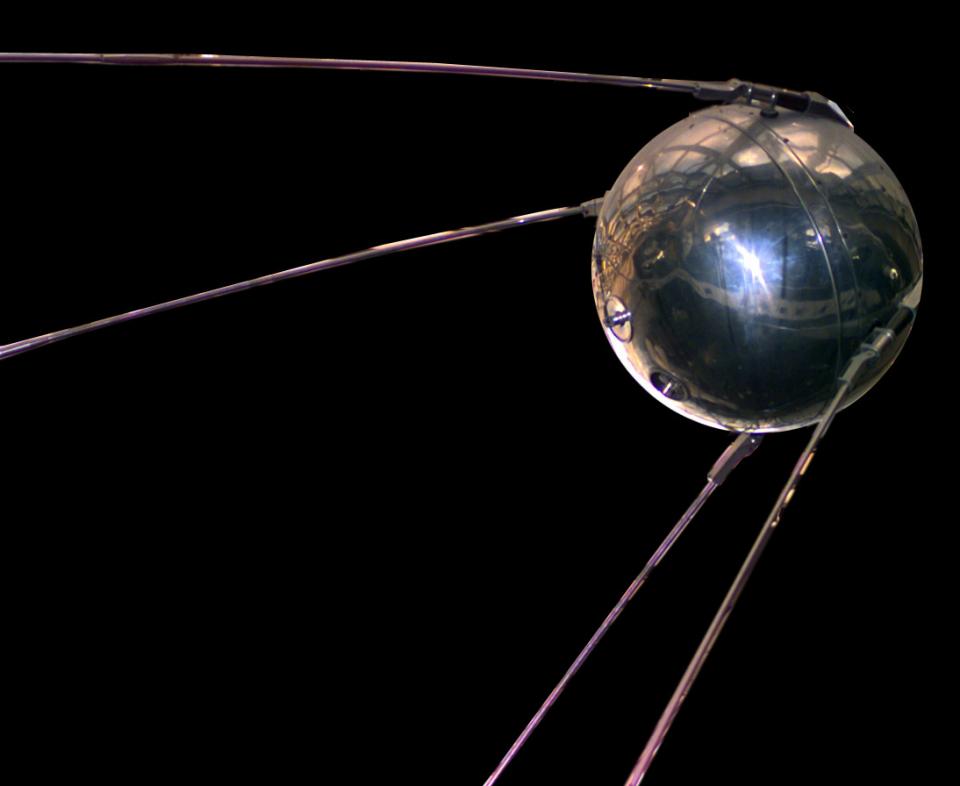
Sputnik 1, the first artificial satellite to orbit the Earth
Image by Wikimedia Commons, image name: Sputnik.jpg
Naturally, today is being celebrated by most people involved in the space sector all around the world. Here at the European Space Agency’s Headquarters in Paris where I work, staff, contractors and ESA pensioners were invited this morning to join ESA Director General Jan Woerner to mark the occasion. Not something I could miss out on! Here we gathered in the main conference room used for the ESA Delegation meetings and council meetings for a series of presentations related to Sputnik and what it meant for space both in Europe and in the world.
It was quite fascinating to see all of the people, especially the old who remembers this day very well and who worked in the Space sector already in the sixties, come together for the occasion. While I do know our history very well, it also taught me quite a few new details not commonly talked about in the history books.
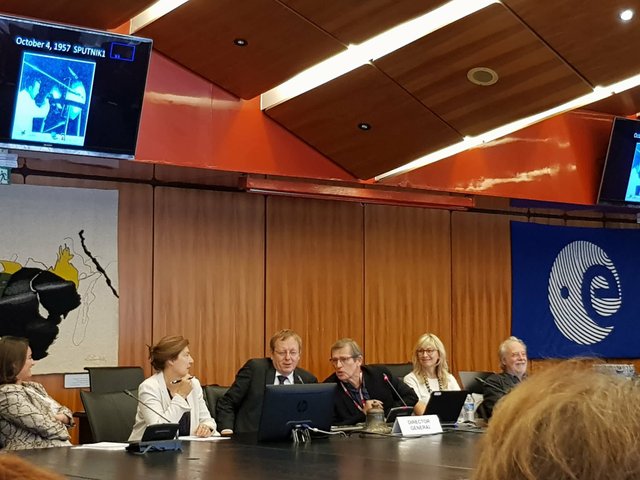
ESA Director General Jan Woerner opening the Sputnik celebration conference in the ESA Headquarter’s main meeting room
Image taken by me
So, having just sat through a bunch of lectures, I thought it would serve as a good opportunity to share some information about Sputnik 1, and also add some of my reflections when looking back on the event that changed the course of history, and gave rise to the growth in space capabilities which again has offered me the opportunity to be where I am at today.
So why did a beach ball-sized piece of metal like Sputnik cause such a mess?
There are good reasons why Sputnik caught the attention of the world the way that it did 60 years ago. On the day, all the world's media, and any amateur radio enthusiast in all of the continents of the world, could receive and read Sputnik’s radio signals. This was indeed a very powerful message, as nothing like this had ever happened before in human history, and nobody knew of anyone else having this sort of capabilities.
It’s perhaps difficult to imagine what it must have felt like to citizens living at the time. Today, we take global communication for granted, and we expect to instantly get online to investigate ourselves what is going on. But if you look back at the state of technology, the average level of education, or how information is received and published at national levels in the fifties, you’ll quickly realise that the average guy on the street must have perceived this technological achievement very differently. What would they imagine that the Soviets could be able to achieve next with their limited understanding of space and technology? Would the Russians now be able to overhear every conversation heard on the planet? Would they be able to spy on everyone with big earth observation satellites?! Would they be able to transport weapons and bombs into space capable of launching an attack on anyone at any time?!!? When your understanding is limited, but your fears are not, you’ll quickly extrapolate. Just how doomed did people back then think that the future was?
American president Eisenhower, however, was not at all concerned. Indeed, when he first talked to the world following the event in the president's news conference, his words were not exactly filled with fear:
Now, so far as the satellite itself is concerned, that does not raise my apprehensions, not one iota... they say they have put one small ball in the air. - President Eisenhower, October 9, 1957
It's a little-known fact that the Americans also possessed the ability to build and launch satellites well before Sputnik 1 but chose not to go ahead with it (indeed it would be hard to imagine that they would be able to respond to Sputnik 1 within just a few months had they not possessed the technologies necessary). But why did they wait? There's a couple of reasons actually.
First of all, there were no laws in place as to whether national borders stretched upwards also into outer space. Treaties existed declaring that the aerospace above a country belonged to it, but where do aerospace end and outer space begin? None of this had been discussed before it was forced onto the international stage during the space age. Also, Eisenhower completely underestimated the prestige of being the first nation in space, and how it had an effect on the world's view of the two superpowers. Lastly, the launch vehicles possessed by the Americans at the time were all designed mostly by Wernher von Braun. It was simply "not ideal" that the first rocket successfully used by the US would be designed by a German in a time where Nazism was still strongly associated with the country. One might be tempted to say that this somewhat petty reasoning came back to bite them fairly when they then conceded this opportunity to the Soviet instead.
However, Eisenhower's tone soon had to change when the Soviet Union later launched Sputnik 2 with the weight of over half a tonne. Whereas we today remember Sputnik 2 mostly because it carried the dog Laika, at the time people's main concern was not focused on the spacecraft, but rather how powerful the launcher rocket would have had to be to successfully bring something that heavy into orbit. For Sputnik 1, people simply did not know what brought it into space. Demonstrating the ability to take a payload almost 10 times the weight into space, got people's imagination to wonder just how big the rockets were. And although the Sputnik rockets were small compared to what we use today, they certainly were exactly what people feared: Intercontinental Ballistic Missiles.
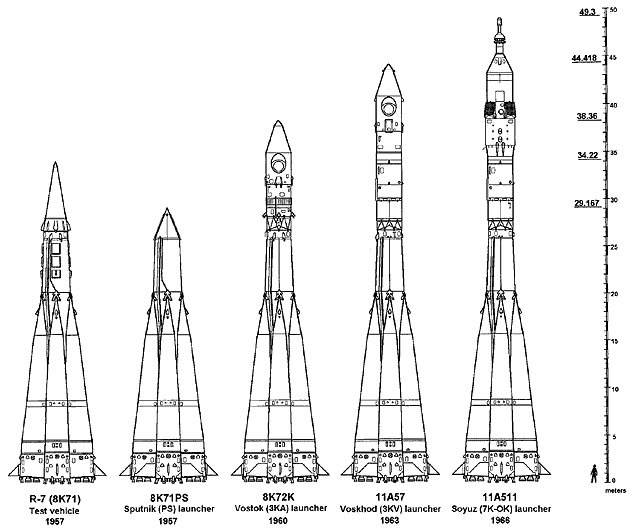
Sputnik 2 was carried into Orbit by Sputnik 8K71PS second from the left in the image.
Image credit NASA Commons Image source
Where we are today
Considering the tension and global sense of worry that the Sputnik moment triggered at the time, it’s interesting now to read and watch how other Space Agencies in the West celebrates the Sputnik anniversary today. To me, it shows how much space has also been a driving force of binding countries together, and it's beautiful to see a time where scientific and technological advancements made in other countries are celebrated and not feared. Perhaps this is the most impressive and important development since Sputnik 1, more so than the scientific.
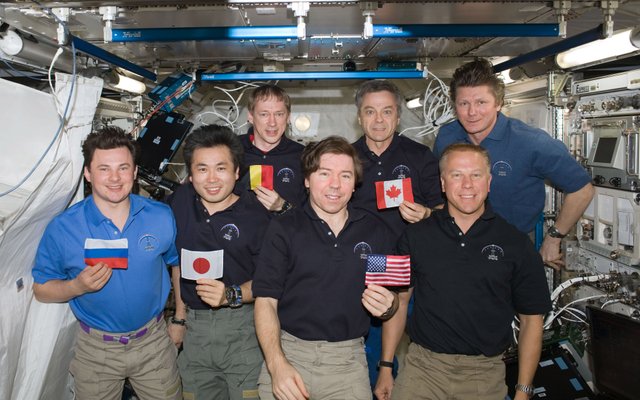
Picture of Astronauts onboard the International Space Station during Expedition 20. The first time all 5 space station partner nations were represented together on board the ISS
Image source
Today, I know space only as a collaborative enterprise where those involved, no matter where they were born, generally share the same visions, ambitions and dreams. It is beautiful to see the way in which Astronauts collaborate at Astronaut training centres worldwide or onboard the International Space Station. Having met Astronauts from most of the countries that have been represented in space, it's always been interesting to observe just how similar they all view politics, the world at large, and the importance of collaboration and diplomacy.
So now that the ink is dry, and we've seen just how much positive international collaboration, as well as scientific and technological advancements the space-era has provided, it's safe to say that it is a day to be celebrated!
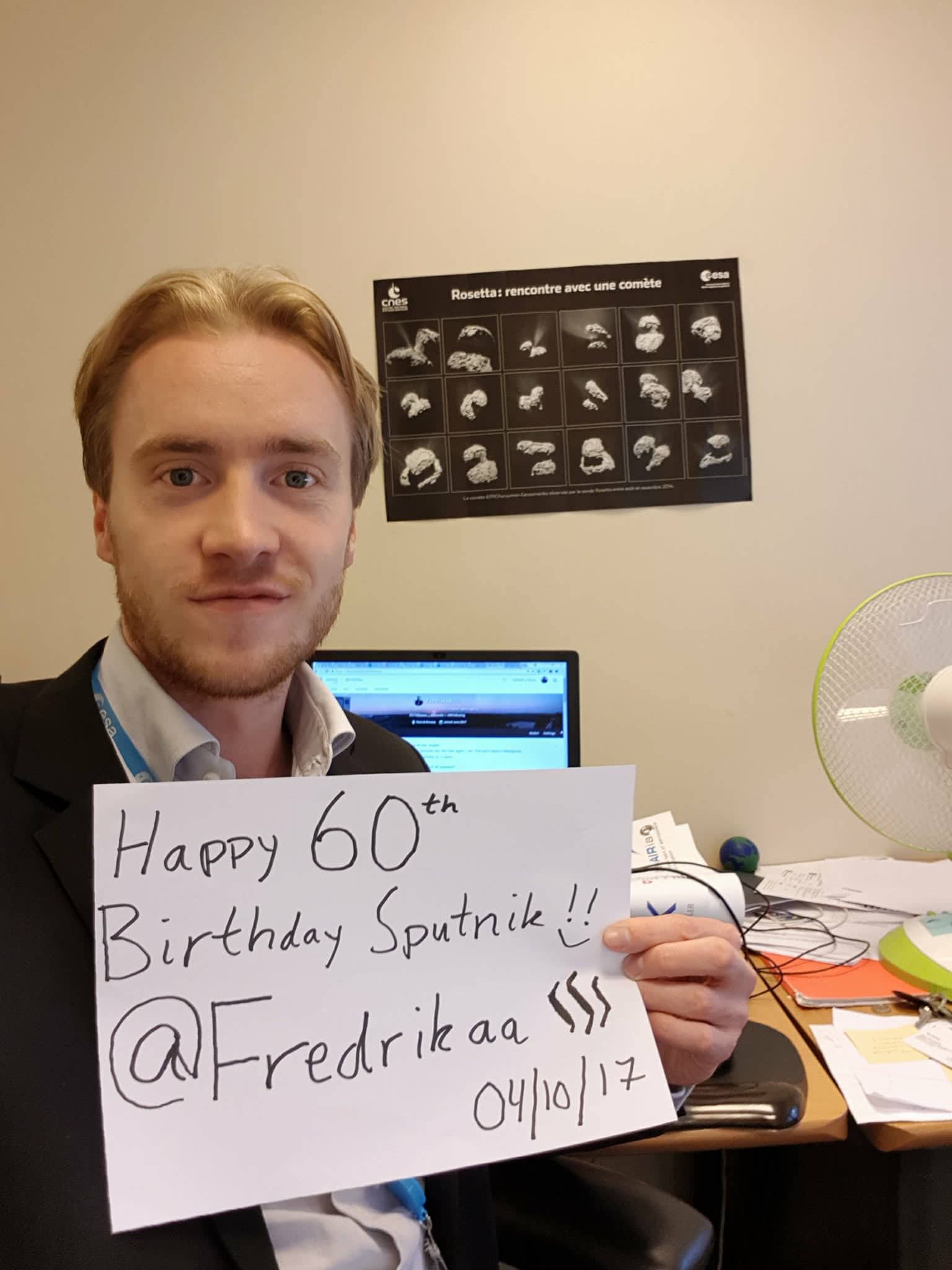
Me and my messy handwriting + an even messier desk from my office at ESA
So that's what's been occupying my mind for much of today :) I'm glad you've read this far and would love to hear in the comments what your thoughts are on the space legacy of Sputnik, where we are in space today, and where you see us going in the future!
Your posts are so great. You're like one of the few people on steemit that I feel really deserve to get a lot of votes and high payout. If you want to see messy handwriting, you should see mine. I'm a nurse, and everytime I signed something at the hospital people would ask "Are you sure you're not a doctor, cuz you have the handwriting of one."
That's very kind of you to say @travelman. I hope I am able to bring some diversity and quality to the pool of posts here on the platform. It's only worth as much as the value people get out of being here really, so I'm happy to hear that from you :)
But it also takes positive engagement and fruitful conversations to get the network effect fully up and going, so I'm also glad to have people like yourself here who contribute to that very well.
Hehe, yeah I've seen plenty of those in my life! My mother is a doctor and I surely must have inherited some of her writings :'D.
I agree with you on this. Great post! Hope to see many more!
Science in general triggers collaboration between people from countries even possibly in war. That is the greatness of science, it has (almost) no border.
PS: I enjoyed reading about the Sputnik story too ^^
Yup, that is true. Especially thanks to the fact that the people who get into science, to begin with, are typically motivated by the desire to learn and discover. Then it doesn't matter from within what borders the data originates, only how it helps solve a problem :P . It is one of the things that makes me an optimist about the future, when I see the colaborative spirit that exist within these circles. So no matter how stupid and ignorant some elected leaders are, those that actually help enable progress are still on the right track :)
One interesting observation though, which was mentioned by one of the historians presenting today, is the contradiction in NASAs stated goals. How can one both aspire to be the leader in science and technology, and also collaborate fully with other nations? Either you share the technological secrets and scientific discoveries you make, and thus bringing others up to your level. Or you pursue being number one, in which case you'll have to keep secrets. It's interesting to observe how, despite the relationships being overall very good, that here in Europe there is a wish for increased transparency and sharing of information than what the US will allow.
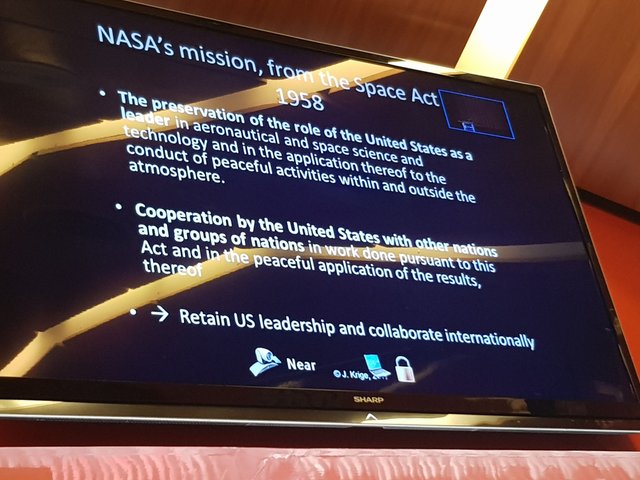
Thought it was a cool point, so had to take a picture of the slide :P
I agree that open access / open source should become a standard. It is already the case, at least partially, in some field. But far from being general... I am confident this may change.
I have said it before and I say it again, you have the coolest job ever.
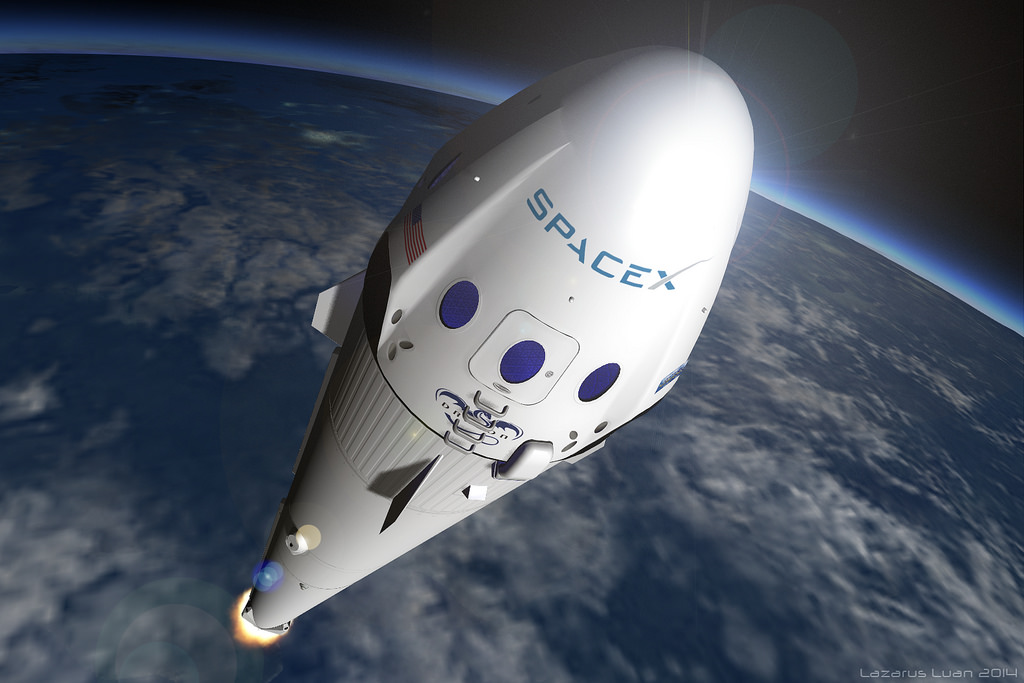
I would have given a lot for working at ESA.
Astronomi and the universe have been a big part of my interest my whole life.
Can feel that I am a bit jealous of you :)
Hehe, well there are cooler jobs at ESA than the one I currently have, so not the coolest job ever, yet ;)
Yeah, I was also in the place where I knew I would do almost whatever it took to get a foot inside this workplace :P so when the opportunity came, I just dropped everything I held and took it immediately ^^.
Well, maybe we can do something related to space together one day ;)
Well, you are on the inside so a heck better than me :)
If my companies grow into the skie some day, I am doing as one of my heroes, Elon Musk, and start a space agency :)
Let me know and I am all into do something related to space any time.
"If you want to make a small fortune in the launch vehicle business, start with a large one." - Elon Musk
At least that's a sentence I have in the back of my mind when, alongside my spacey work, I spend time and effort on steemit, in trading and with some StartUp ideas on the side. :P It's cool to remember that when Elon was younger, he was just as determined to work with Space one day, yet chose to do Zip2 and PayPal. Completely different e-commerce related ideas. So we're on the right track to the stars! ;)
Have you read the biography of Elon Musk? If not, do it, it is just marvelous.

Cool to see that you have some startUp plans.
I also startet up as a (Norwegian word) grunder, and still see my self as on, but now I have also startet investing in companies that I find interesting.
So if you have a space company up your sleeve, let me know
Of course I have read it! (The question is how many times? ;p)
That's very cool to hear! Would love to know more about the companies you've started as well as the portfolio you've invested in. Being able to look at what promising new projects are coming up, and being in a position where one can bet on the future by investing in what you want to be a part of, is indeed great, and something I'm working hard to be able to do myself hopefully :)
I don't have any space startups (yet!) but could give you a few suggestions if you are looking for interesting ones :)
Thank you for sharing @fredrikaa! Must have been exciting and scary times to live. Kind of like living today as well. New Space race and little scary times. :)
Looking forward for Moon base and Mars! ^^
Glad you liked it @m31 :) You find the new space race(s) scary? Why?^^
Yeah, I think we'll have scalable infrastructure on the Moon and Mars earlier than most think. Sustainably sending humans to Mars and allowing them to live there with the right option to "safely" return is probably a bit further off than the biggest SpaceX fans hopes, but we'll get there ;) We need challenges like these to push the boundaries once again!
It took me a while to read your article. Thank you for these good information right from the core of The International Space Agency. You have an incredible job there! I remember I learned at school about Laika, and it's amazing she had that mission so many years before I was born. :) I hope in the next 60 years, the nations and their satellites will work together only for the benefit of humanity.
Glad to hear that you got something out of reading it, and I guess thanks for staying until the very end :P
Not so sure I would be glad for Laika. Another thing I learned today is that while most people had thought the dog died from lack of oxygen. We now know Laika died from being cooked due to the cooling system overheating... Hate to be the one to inform you :p
The next 60 years will indeed be fascinating! Most satellites will be privately owned, so it will be interesting to see what they are used for, and what eventual regulations will have to come in place. As for space exploration, the current situation is one of high collaboration, even in times of political turbulence. Which is great to see.
Thank you for your reply! Sad end for the dog. :( By the way, did you know that actually Romanian Post made a series of commemorative stamps for that lovely female dog and you can read on them: "Laika, the first traveller into Cosmos/Space." ? :)
Don't worry, my handwriting is really awkward as well :P
Hehe^^ We're the orphans of the computer era!
I'm a bit envious of people with a decent hand-writing. But then again, it's not like you get to use it a hole lot anymore :P
It must have been exciting to live in that period, when there were no space flights or satalites yet. I wish I could experience the day when Russia launched Sputnik 1. I can imagine that the most "powerful" country at that time, felt pressured to get ahead in the space race.
After the first moon landing in 1969, there hasn't been really exciting men landings, as Elon Musk says. I hope in my life time there will be an event like Sputnik 1 and the first moon landing!
Great Article @fredikaa!
Yeah it's an interesting thought experiment to look back and wonder how life must have been. I'll have to pick up again the book John F. Kennedy and the Race to the Moon and try to relive the time :)
I'm sure we'll see great breakthroughs from the commercial space sector in the next 15 years that will exceed most people's expectations.
There are already some commercial space flights, but the costs are too high now. Yeah exciting times!
I will keep that book in mind for when I have more time to read!
It is a great book :)
Yeah current commercial space flights for people (not that they are very active) are very costly. But imagine how much a trip for 2 to NY would cost if you were to fly a Boeing 787 and scrap it after landing?! Reusability will help solve this mad problem :)
It makes you wonder if we would even be in space if not for the cold war.
I think we would be. There are so many advantages provided by the space-based infrastructures in telecommunications, navigation and earth observation that there would be a business for it eventually. But the priorities of agencies would be much different.
I think the cold war pushed the space industry forward, making technological leaps that otherwise would have happened at a much slower pace. I agree with fredrikaa, business based side would still have happened, telecommunications etc. However exploration of other planets and the moon may have not happened.
Space station orbiting the moon, base on the moon, base on mars. All current plans of both NASA and Space X. Do we think they'll compete with each other on these projects? Or due to the huge resources involved do you think they'll have no option but to collaberate with each other?
I think they'll collaborate. But it will look different to what you've seen in space so far.
The space companies will probably need to protect some patents and sustain their business models in a way you would not see if it was only agencies working on the projects. So I see collaboration taking form in that agencies, whose job it is mainly to enable space-based science and push technologies enabling space exploration, will look to join complementary private projects. Sometimes as the main customer, sometimes as a research partner.
I can imagine many of the current jobs done by agencies will be taken over by companies (providing launch capabilities and infrastructures) allowing agencies to focus more specifically on their own tasks related to science and cutting-edge technology developments.
I like your take on this and would be inclined to agree with you for the most part. However Elon Musk released all of his patents regarding tesla in order to move the electric car industry forward. Could he do the same for SpaceX?
60 years wow. 100 years is right around the corner basically.
hmm, for Sputnik 1's 100 year anniversary I'm positive that we'll have people living on Mars :D